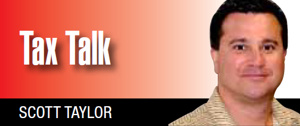Do you smell that? It's February, something is brewing, and the aroma is wafting this way. It's not the sweet smell of snowmobile exhaust. It's just as toxic and oddly familiar. No, it's tax season, and that smell is fear from all the folks who are not prepared.
Hopefully, that odor is not being projected by you. You've been diligent throughout the last year and your bookkeeping is up to date. You know what your income statement looks like and approximately what your tax bill is going to be. You're actually looking forward to seeing it finalized in your hand and not just a projection from your accountant.
Tax season is all about one thing: reducing your tax obligation so you owe Canada Revenue Agency as little as possible. How do you do it?
First, you need a plan. Owner/operators who come through tax season smelling clean typically have a clear understanding of their income, expenses, paperwork requirements, filing deadlines, and any new tax rules that apply to them.
They take the business end of their trucking business seriously and set aside time away from the road to get good advice about their specific circumstances. Every person is different, and what you hear on the grapevine may not apply to you or even be correct.
Second, they remember one simple rule: it's not what you earn, it's what you keep. The amount of tax you owe is based on the net income (profit) shown on your business statement. Whether you gross $100,000 or $250,000 does not matter. What counts is your net income after deducting all of your expenses. If $250,000 of gross income less fuel, insurance, licence, repairs, etc. becomes $50,000, then your income tax and CPP are based on $50,000.
So the way to reduce the tax you owe is to get your net income as low as possible. That's why it's important to deduct every possible valid expense.
This is where dealing with accountants who specialize in trucking can help. Their expertise can ensure that you've properly recorded every expense, especially those that come under scrutiny by auditors. I've written about these "gray area" items in this column before:
Service vehicle: The key is to log your business-related travel in a journal so you can calculate the percentage of kilometres the vehicle was used for business during the year (your accountant can provide specific details about CRA requirements). To find the business-use percentage, divide the number of business kilometres by the number of total annual kilometres. You can then apply this percentage against lease payments or loan interest, fuel, repairs, maintenance, washes, and other service-vehicle expenses.
Office in the home: You must detail the square footage and possibly the hours of use of your office workspace in your home to determine a business-use percentage. Apply this percentage against heating, electricity, home insurance, property taxes, rent, or mortgage interest.
Income splitting: This can get complicated with worker's compensation and other employmentrelated issues, but the object here is to get income onto the tax return of the family member in the lowest tax bracket. Any income paid to your spouse, son, or daughter has to be shown on their return and has to be reasonable in terms of an hourly wage for work they have done for you.
Interest: You can deduct the interest expense on money borrowed for business purposes. It's easy to calculate on your truck loan, but not so easy on credit cards and lines of credit that are both personal and business related. I went into great detail about this in my December column.
Medical premiums: These can either be expensed as part of your business or go directly on your tax return. As with most anything else, the rules seem to be constantly shifting and there are minimums and maximums to be concerned with. Ask your accountant for advice based on your personal circumstances.
Meal claims: Meal claims of course continue to baffle the inexperienced. Whether incorporated, sole proprietor, or employee, I see new-client tax returns all the time with meal claims not handled correctly.
Many clients come to us just at tax time for help with these issues. They want our review of not only standard nuts-and-bolts expense claims like fuel and insurance, but also our input on other items that can potentially reduce the amount of tax they owe. Of course, we have other clients whom we meet with for planning throughout the year so there are no surprises or last-minute stresses.
Either way, the goal is to reduce your net income and your tax payable legitimately, not to just expense items without a sound approach and knowledge of the industry. Nothing draws an auditor to a tax return like a stinky expense claim.
Scott Taylor is vice-president of TFS Group, providing accounting, bookkeeping, tax return preparation, and other business services for owner/operators.
Learn more at www.tfsgroup.com or call 800-461-5970.
